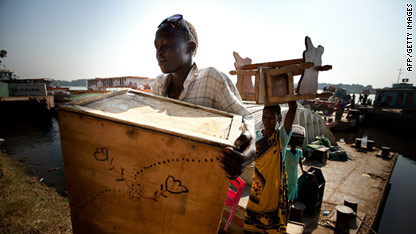 Khartoum, Sudan (CNN) -- Under a tree by a dusty street in Khartoum, university graduates are preparing to head home. They have a long journey ahead of them as these former students will travel from the north of Sudan to their homeland in the south.
Khartoum, Sudan (CNN) -- Under a tree by a dusty street in Khartoum, university graduates are preparing to head home. They have a long journey ahead of them as these former students will travel from the north of Sudan to their homeland in the south.Africa's biggest nation however could soon be a lot smaller, and this is no ordinary home-coming for the graduates. They are preparing to register to vote in the referendum for Southern Independence in January.
Next month's referendum will allow people from the Southern half of Sudan to choose their own path: stay with the government or go it alone as an independent nation.
Since independence in 1956, there have been lengthy periods of civil war between North Sudan, where most of the political power lies, and South Sudan, where oil fields have since been found.
The predominately Muslim North has wanted to unify the country with Islamic ground rules despite deep-seated cultural and religious differences in the South.
This North-South conflict is separate from the Darfur violence, which is undergoing its own tentative peace process.
Read Jane Ferguson's story from a rebel camp in Darfur
Many southerners fled to the North for safety over recent decades as one of Africa's longest running civil wars played out in their homeland. Khartoum itself has numerous voter registration facilities, and the deadline was extended by a week but southerners are wary, opting to leave town rather than sticking around to vote.
Akokbol graduated a few weeks ago. He is the only one of his group who agrees to give his name and speak with me.
"If people are going to vote here there is intimidation that the Northern parties are doing, like they are intimidating our people to vote for unity, which is in their interests," he said.
Akokbol waited with a group of friends for a bus that would take them to Juba, the southern capital. Like most southerners, he is sure of how he will vote.
"Most of us Southerners, particularly me, are going to vote for the independence of south Sudan," he explained. "Because I have seen nothing of unity for so much time - we have never seen any change for our people in south Sudan."
His friends drinking tea beside him said they were afraid of the government having their names if they vote for separation while they are in Khartoum.
The same day, a voter registration center for Southerners was silent. It took more than an hour to find it and despite asking directions over a dozen times, almost no one knew where it was.
An official working there declined to give his name, but said southern people were fearful of the future and how the north's ruling party, the National Congress (NCP), led by President Omar al-Bashir, would respond to a vote for separation.
Hydera works for an NGO called Future which will monitor the elections. He waded into the debate with further allegations -- this time of foul play and incompetence by the southern bodies organizing the referendum.
"There are many obstacles, and one of the obstacles is this Southern Sudan Referendum Commission - there are not enough logistics and stuff," he said. "Also there is not enough media for people to know if there is registration or not. Besides, they are telling people not to register."
Accusations against southern groups were repeated by Gatbang, a former member of the Sudan Peoples' Liberation Movement (SPLM) who my government media minder introduced me to.
"Southerners are widely being intimidated by the SPLM," he said. "They are discouraging them from registering themselves in the preliminary process of the registration. This is another ploy that the international observers will see -- that the southerners in Khartoum, or in the north, have declined to register because of the claims by the SPLM that the ruling party in the north will rig the vote."
Despite being trained in Cuba and having years of experience fighting al-Bashir's government, Gatbang is now heavily critical of the possibilities of southern independence.
"There will be great tribal clashes, tribal conflict in the south, simply because southern Sudan has not yet embraced nationalism," he said, standing outside a National Congress building. "There will be no central government. Southern Sudan will be more or less like Somalia."
With political tensions rising in Khartoum, getting an honest answer is tough. Before meeting Gatbang at a government building, my arrival caused a furor amongst NCP employees, followed by much pushing and shouting.
There is major international concern however that January's referendum could result in more armed conflict, should al-Bashir's government refuse to recognize a vote for independence. The south lays claim to major oil reserves so the economic repercussions for Khartoum could prompt violence.
Yasir Oman is a leading SPLM figure who earlier this year withdrew from a presidential election campaign challenging al-Bashir.
"There are many issues between the north and the south that have not been resolved," he said. "The referendum has to go smoothly and all issues have to be resolved between the SPLM and the National Congress. War is not the answer to what Sudan is facing now."



